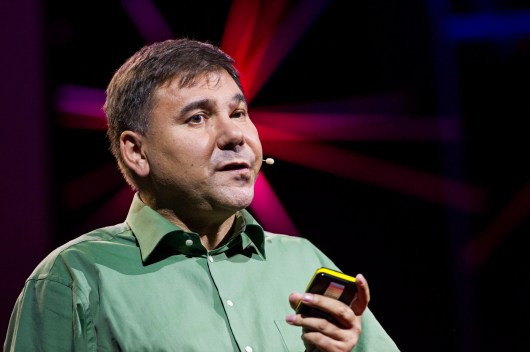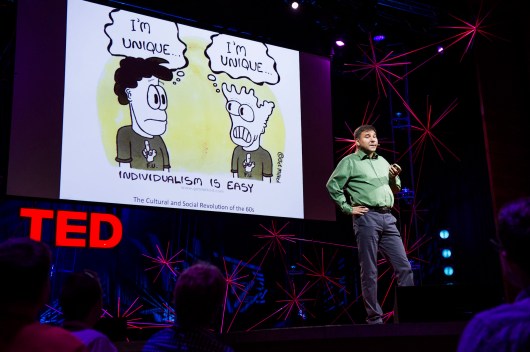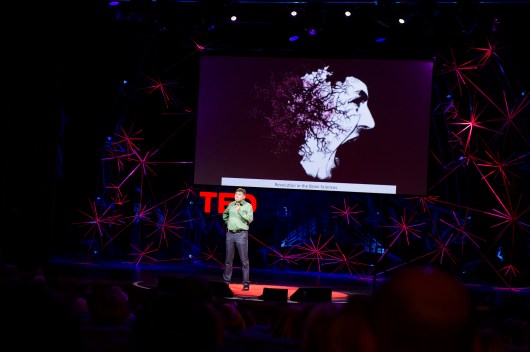What’s going wrong with democracy?
Iavan Krastev is a political scientist to speak about crisis in Europe. Not, in his words, an inspiring topic. And he’s here to talk about some of the problems with openness, in contrast to most of the talks. “You people in the church of TED,” says Krastev, “are very optimistic. You believe in complexity, but not ambiguity.”
He asks us to imagine a rainy election day in any country. No one goes to vote before 4pm, then suddenly everyone comes — but three-quarters of the people vote with a blank ballot. That paralyzes the government and the opposition. They know what to do with protesters, but not this. So they hold it again, and this time 87% cast a blank ballot, to say they have no one to vote for.
That is the opening of a Saramago novel, but for Krastev it captures the problem of democracy. People don’t question that democracy is the best form of government, but they have lost trust. And hence, over the past years there has been a constant decline in electoral turnout. And more worryingly, the people who are least interested in voting are those who actually have the most to gain. Polls have shown that 89% of Europeans believe there is a growing gap between the opinions of the people and leaders.
How did this happen, asks Krastev, that in a technologically transformed world with more rights than ever before, this trust has collapsed?
What went right and what went wrong?
Krastev goes through a list of five revolutions that transformed the world over the past 50 years. First, he uses them to show what went right, then shows how the same revolutions are what went wrong.
- The cultural and social revolution of the ’60s and ’70s. It opened the door to nonconformism and individuality, but it also gave the idea that individualism is easy, and lost the shared purpose of society.
- The market revolution of 1980s. Though many on the left hate it, this was the revolution that led to the idea that the government knows best, and to a choice-driven society. It also lead to a huge increase in inequality in societies. Until then the spread of democracy was always associated with declining inequality. Now, that is reversed.
- The 1989 revolution at the end of the cold war, a very good thing. But it also destroyed the social contract in the west between the elites and the people. During the cold war, the rich and powerful needed the people because they feared them. Now, “You have a strange situation where the elites got out of the control of the voters because the voters are not interested in voting anymore.”
- The internet revolution. Wonderful, as this audience knows very well. But with all the benefits, the public space has been destroyed. There is more polarization, and a lack of common language. He asks: “Have you seen what the digital world has done to American politics these days?”
- Revolution in neurosciences. This has totally changed the way we understand how people think. In particular, only 3-5% of decision is taken on the rational level, so there is no need to have a rational platform. Political operatives have learned not to talk about ideas or issues, but to manipulate emotions.
Krastev hammers home that point — what went right is also what went wrong. He warns that we have to get used to the idea that “Some of the things that we love most are things that can hurt us most.”
The dangers of transparency
There is an idea that transparency is going to restore trust in institutions. He is much more skeptical. Instead, this is going to fundamentally change politics. It will be much more about managing trust, not creating trust. Mistrust, of course, was always important to democracy, that’s why you have checks and balances.
But when managing trust is all you do, says Krastev, “Transparency seems like 1984 in reverse.” Instead of Big Brother watching us, we’re watching Big Brother. That seems like a great idea, to monitor and hold politicians accountable.
He asks us to think about the fact that we can check statements of politicians against their previous statements. Again, it seems like a great way to keep them accountable. But he warns, if we do that, we should expect consistency to become the most important virtue for a politician. “But that’s not what democracy is about, it’s about people changing their minds … based on rational arguments and discussions.”
Any unveiling is also veiling.
Krastev gives a final warning about transparency. If you ask governments to be “open,” they’re going to be selective about it. He tells the story of a nation that decided all discussions among ministers were going to be published online. Krastev asked the Prime Minister, “Why did you do it?” The answer: “This is the best way to keep the mouths of my ministers closed.”
He closes with a final warning — a quote from Goethe to keep in mind, “There is a big shadow where there is much light.”
Photos: James Duncan Davidson



Comments (3)
Pingback: Shadows in the light of openness: Ivan Krastev | s o c i a l i n v e s t i g a t i on
Pingback: TEDGlobal 2012 на TEDxNBU Live « Into the wild